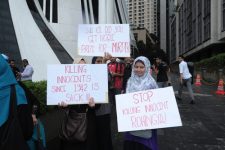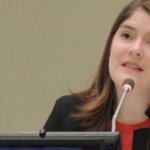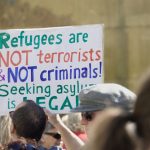Silencing Dissent: Myanmar Authorities Arrest Journalists

At around 3.30pm on June 26, a group of seven people were arrested by Myanmar authorities at a military checkpoint in the country’s conflict-ridden northern Shan state. Three local journalists were among the group who were detained in Namhsan township in the north of the region.
Democratic Voice of Burma reporters Aye Nai and Pyae Phone Naing were arrested, along with the Irrawaddy’s Thein Zaw, also known as Lawi Weng. The journalists were returning from a drug burning ceremony marking the United Nations International Day Against Drug Abuse and Illicit Trafficking.
The event had been organised by the Ta’ang National Liberation Army (TNLA), one of more than a dozen armed ethnic minority groups that have been in conflict with the Tatmadaw – Myanmar’s armed forces – for decades now.
The TNLA were not one of the eight armed groups that were a signatory to the October 2015 Nationwide Ceasefire Agreement. However, the group did attend the second round of the Panglong Peace Conference held in the Myanmar capital Naypyidaw in May this year.
Modern laws silenced by relics of the past
After initially being held at an undisclosed location for three days, the journalists are now being detained in Hsipaw prison and have since been charged under colonial-era security laws, that the Myanmar government still routinely uses, despite international pressure to cease doing so.
Section 17(1) of the Unlawful Associations Act provides that anyone who’s a member of an unlawful association, or takes part in meetings with or contributes to such an association, “shall be punished with imprisonment for a term” of up to three years.
The arrest of the reporters seems at odds with Myanmar’s News Media Law, according to Human Rights Watch. Enacted in June 2015, section 7(a) of the law provides that a journalist “shall be exempt from being detained” by security forces “where wars break out and conflicts… take place.”
Volatile border regions
Conflict has been escalating over recent years in the north of Shan state. The fighting involves a myriad of ethnic minority groups and government security forces.
All of the armed groups are involved in the profitable local drug trade. Along with being a major opium producer, Myanmar is the largest producer of methamphetamine in the world.
Meth pills are widely produced in the northern border regions of the country. These drugs are relatively cheap and readily available across Asia. The pills – popularly known as yaba – contain a concoction of crystal meth and caffeine.
Research carried out by Amnesty International outlines that since late 2016 the Myanmar security forces have been carrying out torture and extrajudicial killings in the region. While groups like the TNLA have been documented abducting civilians and imposing “taxes” on villages.
Amnesty International Australia’s Crisis Campaign Coordinator Diana Sayed has called on the Australian government to demand that Myanmar authorities end restrictions on humanitarian access into these areas, and bring a halt to the ongoing human rights violations in the region.
A crackdown on reporters
The three journalists currently being detained are not the first to have been silenced over recent months. In late October last year, journalist Fiona MacGregor was sacked by the English-language Myanmar Times for reporting on alleged rapes perpetrated by government security forces.
An article by MacGregor was published on October 27 about the alleged rapes of up to 30 Rohinyga women in the north eastern state of Rakhine. At that time, the region was in lockdown, as Myanmar armed forces were carrying out a counterinsurgency operation in Maungdaw township.
The journalist said the paper had informed her that she’d “breached company policy by damaging national reconciliation.” And some of the senior staff at the paper led her to believe that the government had put the pressure on to dismiss her.
The silent Nobel laureate
Press freedoms in Myanmar are still uncertain after the nation recently emerged from decades of military rule. Despite the National League for Democracy party winning the country’s first free elections in 25 years in November 2015, the military still maintain key government positions.
Aung San Suu Kyi is now Myanmar state counsellor, which is the de facto head of state. However, the Nobel Peace Prize winner has been criticised for her slow approach to condemn the current detention of the three journalists, as well as a number of other infringements on media freedom.
Ms Suu Kyi has also come under widespread international criticism for her initial lack of response, and then for her approach, to the escalating violence that was unravelling in the state of Rakhine in October last year.
A question of genocide
Sectarian riots broke out in Rakhine state in June 2012, as extreme factions of the Rakhine Buddhist population began violently attacking and burning down villages of the Rohingya Muslim minority. This drove an estimated 120,000 Rohingya into internally displaced people camps that line the Bay of Bengal.
In October last year, Myanmar forces launched sweeps in the north of the state, after members of an alleged militant group known as Harakah al-Yaqin attacked three police posts along the Bangladeshi border, killing nine officers.
Ms Suu Kyi said in April that the ongoing violence and persecution of the stateless Rohingya was not ethnic cleansing. And last week, the state counsellor again rejected a decision by the UN to send a fact-finding mission into the region, ordering that visas not be issued to delegates.
A stateless people
There’s an estimated 1.3 million Rohingya people living in Rakhine, making up about a third of the state’s population. However, the Myanmar government doesn’t recognise them as citizens. It refers to them as Bengalis, and classes them as illegal immigrants from Bangladesh.
The recent unrest in the state has led more than 75,000 Rohingyas to flee across the border to Bangladesh, while another 23,000 have become internally displaced within the state. And reports of systematic rape and human rights abuses carried out by the Myanmar military continue to emerge today.
Rohingya rights activist Aung Win lives in the state capital of Sittwe. He told Sydney Criminal Lawyers® last November that at time the government couldn’t find any terrorists, so they were arbitrarily “arresting people and burning houses.”
But if the authorities continue on causing the Rohingya people so much “frustration and depression,” Mr Win warned, it could actually lead to the establishment of some form of militant group.







